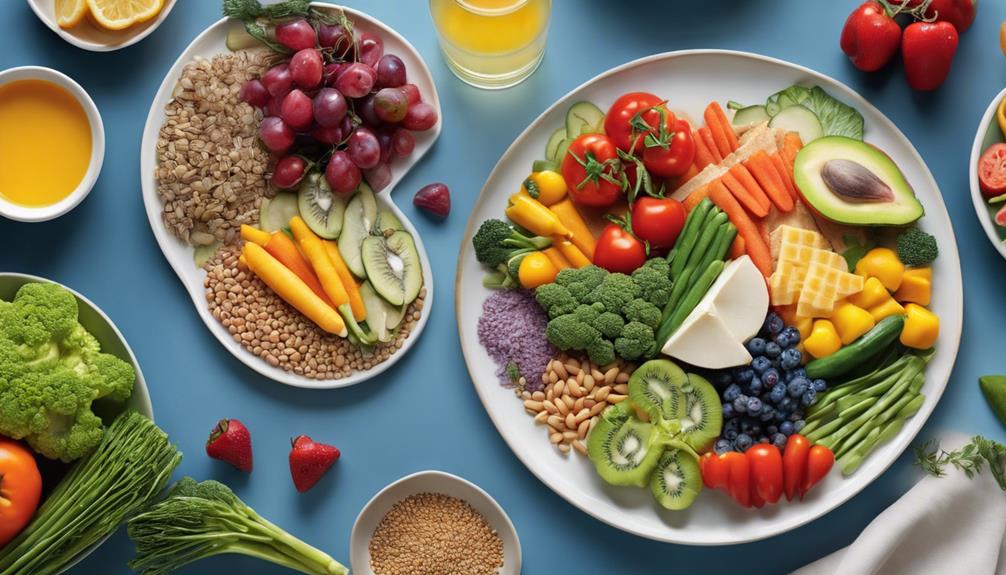Embarking on a weight loss journey while breastfeeding can be likened to navigating a delicate balance, where nourishing both body and baby is key.
Exploring the 'Top 10 Breastfeeding Diet for Weight Loss Tips' offers a roadmap for achieving wellness goals post-pregnancy.
By discovering strategies that prioritize nutrient-dense choices and mindful eating habits, mothers can foster a healthy lifestyle that supports both weight management and overall well-being.
Revealing the nuances of this unique journey can open a world of possibilities for those seeking sustainable and effective approaches to postpartum health.
Key Takeaways
- Hydration is crucial for milk production, digestion, and weight loss during breastfeeding.
- Balanced nutrient intake with whole foods supports health, baby development, and weight management.
- Incorporate superfoods like quinoa, salmon, and chia seeds for postpartum recovery and weight loss.
- Seek professional guidance from a nutritionist for personalized weight loss strategies and postpartum health.
Importance of Hydration
Staying well-hydrated is paramount for breastfeeding mothers as it directly impacts milk production and overall health. Adequate hydration plays a vital role in ensuring a healthy breastfeeding journey. When breastfeeding, the body requires more water to support milk production, aid in digestion, and maintain energy levels. Water intake not only influences milk supply but also helps in eliminating toxins from the body, promoting overall well-being. Dehydration can hinder milk production and leave mothers feeling fatigued, emphasizing the importance of maintaining proper hydration levels.
Breastfeeding mothers should aim to consume a minimum of 96 fluid ounces of water daily to support their bodies during this demanding time. By staying hydrated, mothers can optimize their milk supply, energy levels, and overall health. Water acts as a natural cleanser, flushing out toxins and ensuring that the body functions efficiently while breastfeeding. Prioritizing hydration is essential for both the mother's well-being and the quality of milk provided to the baby.
Balanced Nutrient Intake

To optimize weight loss while breastfeeding, maintaining a balanced nutrient intake rich in essential proteins, fibers, vitamins, and minerals is important. When looking to lose weight, it's vital to provide your body with the necessary nutrients to support both your health and your baby's development.
Including whole grains, lean proteins, fruits, vegetables, and healthy fats in your diet can help you achieve a healthy balance of nutrients while promoting weight loss. These foods aren't only nutrient-dense but also help you feel full and satisfied, making it easier to manage your calorie intake.
Avoiding highly processed and sugary foods is essential as they often lack essential nutrients and can lead to excess calorie consumption. By focusing on whole, natural foods and staying hydrated with water and clear fluids, you can support your body's needs for weight loss while ensuring you and your baby receive the necessary nutrients for overall health.
Mindful Snacking Habits
For best weight loss results while breastfeeding, incorporating mindful snacking habits is crucial to support your nutritional needs and maintain energy levels. When choosing snacks, opt for nutrient-dense options like fruits, vegetables, nuts, or yogurt to keep you satisfied and provide essential vitamins and minerals.
Mindful snacking can help you regulate calorie intake and make sure you're getting the necessary nutrients for lactation. Avoid high-calorie, processed snacks and instead focus on whole foods to support your weight loss goals. Incorporating healthy fats, such as avocado or nut butter, into your snacks can promote satiety and aid in milk production.
Planning ahead by prepping healthy snacks can prevent impulsive, unhealthy choices and keep you on track with your weight loss journey. By being mindful of your snacking habits and choosing nutrient-dense options, you can support your overall health while achieving your weight loss goals.
Incorporating Superfoods

When it comes to weight loss while breastfeeding, incorporating superfoods into your diet can be a game-changer. Superfoods such as quinoa, chia seeds, and leafy greens offer a powerhouse of nutrients to support your postpartum health journey.
These nutrient-rich options can be effortlessly included in meals and snacks, providing essential vitamins and minerals for both you and your baby.
Superfoods for Breastfeeding
Incorporating an array of superfoods into a breastfeeding diet is essential for enhancing milk production and promoting postpartum weight loss. Superfoods like oats, salmon, and leafy greens can boost milk supply while supporting your weight loss journey.
Including flaxseeds, almonds, and quinoa in your meals provides important nutrients for both you and your baby. Chia seeds, blueberries, and Greek yogurt are rich in antioxidants, aiding in postpartum recovery and overall well-being.
Don't forget to add lentils, sweet potatoes, and avocados to maintain energy levels during this demanding time. These nutrient-dense foods like spinach, berries, and nuts are packed with important vitamins and minerals important for breastfeeding mothers.
Nutrient-Rich Choices
To optimize nutrition for both mother and baby during breastfeeding, focusing on nutrient-rich choices that incorporate superfoods is key. Superfoods like quinoa, chia seeds, salmon, berries, nuts, and dark leafy greens provide essential nutrients for postpartum recovery and overall health. Here is a table highlighting some nutrient-rich choices for breastfeeding mothers:
| Superfoods | Benefits |
|---|---|
| Quinoa | High in protein and fiber |
| Chia Seeds | Rich in Omega-3 fatty acids |
| Salmon | Supports brain development in infants |
| Berries | Packed with antioxidants and fiber |
| Nuts and Seeds | Boost protein and healthy fats intake |
| Dark Leafy Greens | Provides vitamins and minerals important for recovery |
Incorporating these superfoods into a balanced diet along with moderate exercise supports a healthy lifestyle and postpartum weight loss.
Meal Ideas and Recipes
For best nutrition and weight loss benefits during breastfeeding, consider incorporating superfoods like spinach, blueberries, and salmon into your meals. When planning your meals, try these nutrient-rich and delicious options:
- Quinoa bowls with mixed veggies
- Grilled chicken salads
- Chia seed smoothies
- Avocado toast with eggs
Incorporate lean proteins such as turkey, tofu, and Greek yogurt to support muscle recovery and metabolism. Experiment with recipes like lentil soups and sweet potato chickpea bowls for variety and taste.
For snacks, opt for almonds, Greek yogurt with berries, or hummus with carrot sticks to curb cravings and maintain energy levels throughout the day. Enjoy these meal ideas and recipes to nourish your body and support your weight loss goals while breastfeeding.
Meal Planning Strategies

When planning meals for weight loss while breastfeeding, prioritize including a diverse range of nutrient-dense foods to support both your health and your baby's needs. It is important to plan ahead, making sure meals are well-balanced and avoid impulsive choices that may derail your weight loss efforts. Incorporate a variety of fruits, vegetables, whole grains, and lean proteins to provide essential nutrients for you and your baby. Monitoring portion sizes is important to prevent overeating and aid in achieving your weight loss goals. Including healthy fats like avocados and nuts can increase satiety and provide essential nutrients necessary for breastfeeding. Opt for whole, unprocessed foods over processed options to maximize nutritional benefits. Below is a helpful table to guide your meal planning efforts:
| Meal Planning Strategies | Tips for Success |
|---|---|
| Plan Ahead | Ensure balanced nutrition and prevent impulsive eating |
| Diverse Foods | Include fruits, vegetables, whole grains, lean proteins |
| Portion Control | Monitor sizes to prevent overeating |
| Healthy Fats | Incorporate avocados and nuts for essential nutrients |
| Whole Foods | Choose unprocessed options for maximum benefits |
Smart Postpartum Exercise Routine

After focusing on meal planning strategies for weight loss while breastfeeding, it's important to gradually incorporate a smart postpartum exercise routine to support our overall health and fitness journey. When considering postpartum exercise, it's essential to prioritize gentle exercises that focus on strengthening core muscles and aiding in weight loss.
Here are some tips to guide you in developing an effective postpartum exercise routine:
- Incorporate gentle exercises: Include movements like pelvic tilts and Kegels to strengthen core muscles postpartum.
- Gradually increase activity: Work up to at least 150 minutes of moderate aerobic activity per week to enhance postpartum fitness.
- Allow for proper healing time: Wait for 6-8 weeks postpartum before engaging in more intense exercise routines.
- Consult your healthcare provider: Before starting any exercise routine, make sure it's safe for your postpartum body by consulting with your healthcare provider.
Managing Stress Levels

Managing stress levels is essential for supporting healthy weight loss efforts, as high stress can impede progress by affecting hormone levels and leading to unhealthy eating habits. When stress levels are elevated, the body releases cortisol, a hormone that can increase cravings and lead to overeating, sabotaging weight loss goals. Additionally, chronic stress can disrupt sleep patterns, impacting metabolism and making it harder to shed those extra pounds. To combat these effects, incorporating stress management techniques such as deep breathing, meditation, or yoga can be beneficial in reducing stress levels and supporting weight loss.
Emotional eating often stems from high stress levels, causing individuals to make poor food choices that hinder their weight loss progress. Prioritizing self-care activities like relaxation, engaging in hobbies, or socializing can help lower stress levels and create a more conducive environment for a healthy weight loss journey. By actively managing stress and implementing strategies to reduce its impact, individuals can optimize their weight loss efforts and improve their overall well-being.
Tracking Your Progress

When it comes to tracking your progress on a breastfeeding diet for weight loss, utilizing progress measurement tools is key. These tools can include:
- Keeping a food diary
- Using weight loss apps
- Measuring your portions
Setting achievable goals and monitoring your weight regularly will help you stay on track and make necessary adjustments to your diet plan.
Progress Measurement Tools
To effectively monitor your weight loss progress, utilizing tools such as a bathroom scale, measuring tape, and body fat calipers is essential. Tracking your progress through various methods can provide insights into the effectiveness of your weight loss efforts.
Consider the following tools and techniques:
- Bathroom Scale: Weigh yourself regularly to track changes over time.
- Measuring Tape: Measure body parts like waist and hips to monitor inches lost.
- Body Fat Calipers: Assess body fat levels for a more thorough view of progress.
- Food Journal: Keep a record of your daily intake to manage calorie consumption and food choices effectively.
Setting Achievable Goals
Setting achievable weight loss goals while breastfeeding is important to maintain motivation and avoid setbacks in your journey. Tracking your progress is essential to make sure you are on the right path. A food journal can help you monitor your daily intake and identify areas for improvement. Celebrating small victories along the way will keep you motivated and focused on your goals. Remember to adjust your weight loss goals as needed based on how your body responds to your diet and exercise plan. Stay committed and be kind to yourself throughout this process. Below is a table highlighting key points to take into account when setting and tracking your weight loss goals while breastfeeding:
| Aspect | Description | Importance |
|---|---|---|
| Realistic Goals | Set achievable targets for weight loss. | High |
| Tracking Progress | Monitor body changes and weight regularly. | Medium |
| Food Journal | Record daily intake to improve awareness. | High |
| Celebrate Victories | Acknowledge small wins to stay motivated. | High |
| Adjust Goals | Modify goals based on body's response. | Medium |
Sleep and Weight Loss Connection

In understanding the connection between sleep and weight loss, it becomes apparent that adequate rest plays an essential role in regulating hormones essential for controlling appetite and metabolism.
- Balanced Hormones: Quality sleep helps maintain a healthy balance of hunger hormones like ghrelin and leptin, which can reduce cravings and support weight loss efforts.
- Metabolism Support: Sufficient sleep promotes a more efficient metabolism, aiding in the body's ability to burn calories effectively throughout the day.
- Calorie Burning: Establishing a consistent sleep schedule can enhance the body's natural calorie-burning processes, contributing to weight loss goals.
- Stress Reduction: Quality sleep is important for reducing stress levels, which can impact weight loss by influencing food choices and overall well-being.
Prioritizing adequate sleep and maintaining good sleep hygiene can significantly benefit weight loss journeys by positively influencing appetite control, hormones, metabolism, and calorie expenditure.
Seeking Professional Guidance

When it comes to weight loss while breastfeeding, seeking professional guidance is essential. Consulting with a dietitian can provide personalized advice on nutrition for both you and your baby.
Additionally, a healthcare provider can offer expert recommendations to support your weight loss goals without compromising your milk supply.
Consult Dietitian for Advice
Engaging a qualified dietitian for personalized guidance is essential when starting on a breastfeeding diet for weight loss. A dietitian can provide tailored advice on nutrition, weight loss, and meal plans specific to your needs and goals. Here are some reasons why consulting a dietitian is critical:
- Receive accurate information on nutrition and weight loss.
- Create a sustainable and balanced meal plan for effective weight loss while breastfeeding.
- Avoid common diet pitfalls and guarantee ideal nutrition.
- Benefit from support and accountability throughout your weight loss journey.
Working with a dietitian can enhance your overall experience and help you navigate the complexities of losing weight while ensuring you and your baby receive adequate nutrients.
Doctor's Nutrition Recommendations
Seek professional guidance from a qualified healthcare provider or nutritionist to receive personalized recommendations for your breastfeeding diet. Consulting with a doctor is important for postpartum weight loss while ensuring you meet your nutritional needs and support your milk supply.
A healthcare provider can offer tailored advice on calorie intake to help you shed extra pounds safely. Their expertise will assist you in creating a balanced diet plan that aligns with your weight loss goals and breastfeeding requirements.
Doctor's nutrition recommendations play an essential role in your journey to achieve a healthy weight while nourishing your baby. Trusting in their guidance will help you navigate the complexities of postpartum nutrition successfully.
Nutritionist's Expert Guidance
To optimize your postpartum nutrition and weight loss journey while breastfeeding, consulting with a nutritionist is vital to develop a personalized diet plan tailored to your specific needs and goals. Nutritionists can provide expert guidance on balancing nutrient intake, calorie requirements, and weight loss strategies while breastfeeding.
Seeking professional guidance guarantees that you're meeting your nutritional needs for both weight loss and breastfeeding. A nutritionist can help you navigate dietary challenges, address deficiencies, and optimize your diet for postpartum health. Professional guidance can enhance your weight loss efforts by providing evidence-based recommendations and support.
Frequently Asked Questions
What Is the Fastest Way to Lose Weight While Breastfeeding?
Losing weight while breastfeeding requires a balanced approach. We focus on gradual, sustainable weight loss of 1-2 pounds per week. Essential to consume at least 1800 daily calories to support milk production and choose nutrient-dense foods for a healthy diet.
What Should a Breastfeeding Mother Eat to Lose Weight?
To lose weight while breastfeeding, we focus on nutrient-dense foods like fruits, veggies, whole grains, and lean proteins. Including healthy fats like nuts and avocados for satiety is key. Avoid processed foods, hydrate well, and plan balanced meals.
How to Lose 20 Pounds in a Month While Breastfeeding?
We should focus on gradual weight loss of 1-2 pounds per week while breastfeeding to guarantee milk supply and health aren't compromised. Prioritize a balanced diet and gentle exercises like walking or yoga for safe weight loss.
How to Lose Last 10 Pounds of Baby Weight While Breastfeeding?
Losing the last 10 pounds of baby weight while breastfeeding? We focus on nutrient-dense foods, healthy fats, and hydration. Gentle exercise helps too. Avoid processed foods. Let's shed that weight together for a healthier us!
Conclusion
To wrap up, remember to stay hydrated, focus on balanced nutrients, and mind your snacking habits to support postpartum weight loss while breastfeeding.
Incorporating superfoods, meal planning, and stress management are key.
Tracking progress, prioritizing sleep, and seeking professional guidance guarantee success.
Stay steadfast, strong, and sensible on your journey towards postpartum wellness.









